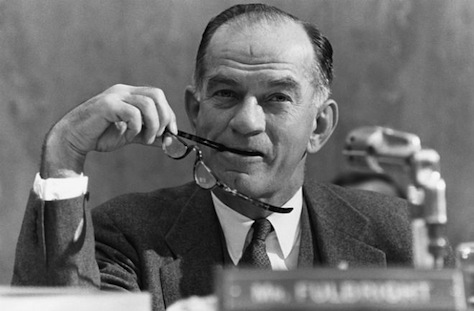One of the great contrasts lurking underneath the latest outrage of the day in American politics is that Arkansas, the state that produced as its senator throughout the late Jim Crow era was a progressive Democratic voice and a crucial dissenting clarion on Vietnam. Fulbright, whose name is synonymous with thoughtful foreign policy in the 1960s and the 1970s, a multilateralist who helped midwife the United Nations and who stood up to the tyranny of Joseph McCarthy’s deranged anti-Communist witch hunts. He also thought the segregation of African Americans was perfectly fine, he joined the filibuster against the Civil Rights Act of 1964, and he opposed the Voting Rights Act of 1965. He served as the head of the Senate Foreign Relations Committee from 1959 to 1974. He was rumored to be John Kennedy’s top choice to be secretary of state, ultimately disqualified by the his shameful support for segregation.
On Monday, Tom Cotton (pictured above), the heir to the other Arkansas seat in the United States Senate, and who won the seat as the darling of the ‘tea party’ movement on the American right, drew verbal missiles from much of the American left (and quite a few moderate Republicans) for organizing a purposefully inflammatory letter to Iran, just as US president Barack Obama and his administration enter a crucial period in negotiations over international sanctions against Iran, a country of over 77 million people, and its desire to build a nuclear energy program.
* * * * *
FROM THE ARCHIVES: As Rowhani takes power, US must now move forward to improve US-Iran relations
* * * * *
The chasm between Fulbright and Cotton is amazing. It’s a lesson in the dynamism of American politics or, really, any political system. The same jurisdiction that just 60 years ago produced a Fulbright can today produce a Cotton. The same jurisdiction than seven years ago enthusiastically supported hard-line conservative ‘principalist’ Mahmoud Ahmadinejad, with his venal anti-Semitic rhetoric, can today embrace the liberal reforms of Hassan Rowhani.
It’s also a lesson that no single political leader or official is right all of the time. Just as Fubright’s record on civil rights appears to us today as inhumane and unjust, Cotton could one day emerge as a thought leader on any number of issues. (Though probably not on Iran, if his Monday letter is any indication).
Yes, Tom Cotton’s letter is basic
No one will remember this stunt a year from now or a decade from now. It probably won’t even have much of an impact by the time March 24 arrives, the latest artificial deadline established by the ‘P5+1’ group of countries reaching for a workable deal in respect of Iran’s nuclear energy program.
Part of that has to do with the letter’s amateur-hour tone: Continue reading On the matter of the ‘Cotton Letter’ to Iran

